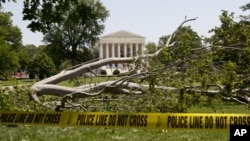The aftermath of last week's violent storms, wildfires and continued heat in parts of the United States is likely to mean more subdued 4th of July celebrations for some Americans this year.
On Tuesday, the eve of Independence Day, about 1.3 million homes and businesses in the eastern United States remained without power while in the western state of Colorado more than 300 homes perished in the wildfires.
Showers and thunderstorms are predicted for the nation's capital during the holiday Wednesday and possibly in the evening when they may diminish the splendor of the nation's greatest fireworks display. Some localities have banned the displays this year to prevent possible fires.
The showers are expected to bring the record temperatures down by a few degrees Wednesday, but the heat will rise up close to 40 degrees Celsius Thursday and remain high until the end of the week. The death toll from the storms and heat in recent days in the region has climbed to 24 so far and is expected to grow with continue heat.
In Colorado, tens of thousands of people who were forced to flee their homes in the area of Colorado Springs are slowly returning to face the devastation of their homes. The total death and destruction toll from the wildfires has yet to be assessed.
U.S. Secretary of Homeland Security Janet Napolitano, Secretary of Agriculture Tom Vilsack and Fire Administrator Chief Ernest Mitchell visited some fire-hit areas Tuesday to survey the ongoing response and convey the government's support for the affected communities.
On the East Coast, recovery efforts continue with utility crews struggling to return power to those who have lost it. Officials have warned that it may take until the end of the week to catch up with the back log. They have also asked citizens to check up on their elderly or sick neighbors who are especially vulnerable to heat. Cool shelters have been made available to those whose homes have no power.
Extremely hot temperatures in the U.S. Midwest have stressed crops in their critical stage of development, raising concerns about crop failures.
Some information for this report was provided by AP, AFP and Reuters.
On Tuesday, the eve of Independence Day, about 1.3 million homes and businesses in the eastern United States remained without power while in the western state of Colorado more than 300 homes perished in the wildfires.
Showers and thunderstorms are predicted for the nation's capital during the holiday Wednesday and possibly in the evening when they may diminish the splendor of the nation's greatest fireworks display. Some localities have banned the displays this year to prevent possible fires.
The showers are expected to bring the record temperatures down by a few degrees Wednesday, but the heat will rise up close to 40 degrees Celsius Thursday and remain high until the end of the week. The death toll from the storms and heat in recent days in the region has climbed to 24 so far and is expected to grow with continue heat.
In Colorado, tens of thousands of people who were forced to flee their homes in the area of Colorado Springs are slowly returning to face the devastation of their homes. The total death and destruction toll from the wildfires has yet to be assessed.
U.S. Secretary of Homeland Security Janet Napolitano, Secretary of Agriculture Tom Vilsack and Fire Administrator Chief Ernest Mitchell visited some fire-hit areas Tuesday to survey the ongoing response and convey the government's support for the affected communities.
On the East Coast, recovery efforts continue with utility crews struggling to return power to those who have lost it. Officials have warned that it may take until the end of the week to catch up with the back log. They have also asked citizens to check up on their elderly or sick neighbors who are especially vulnerable to heat. Cool shelters have been made available to those whose homes have no power.
Extremely hot temperatures in the U.S. Midwest have stressed crops in their critical stage of development, raising concerns about crop failures.
Some information for this report was provided by AP, AFP and Reuters.





